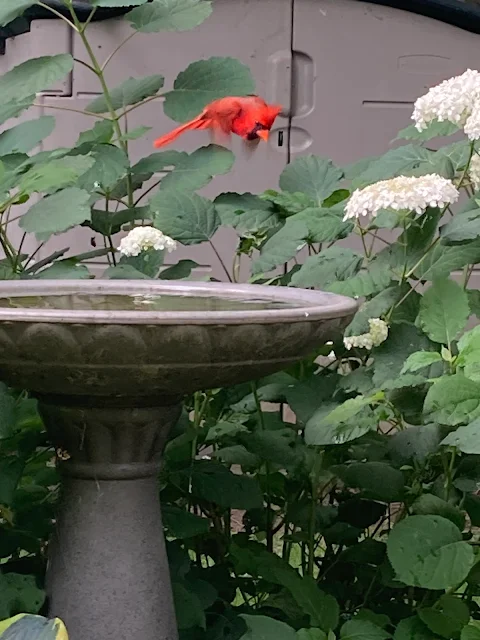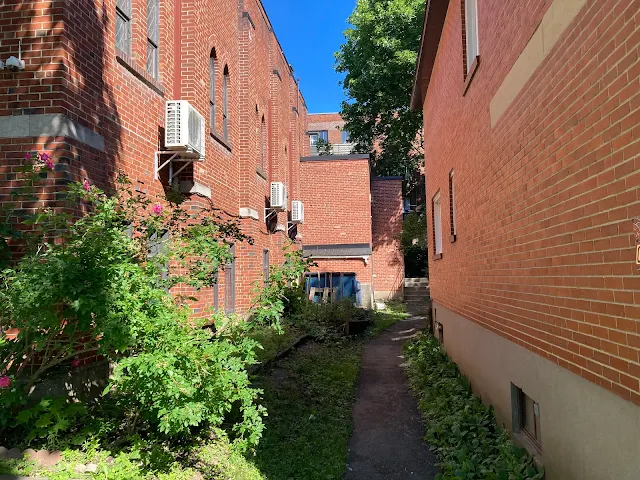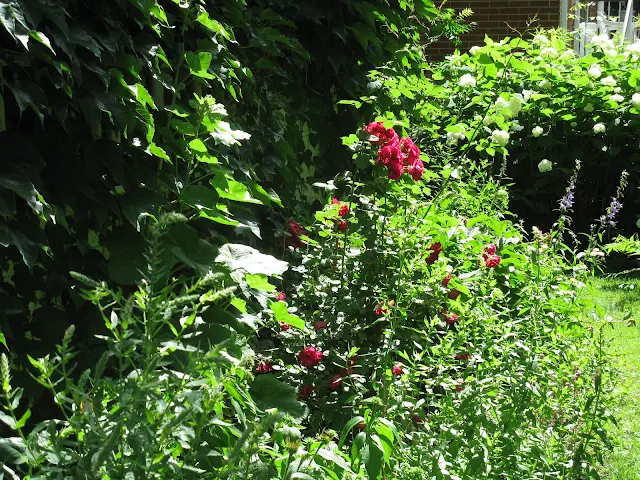Sunday, July 21, 2024
"Won’t Get Fooled Again" by The Who
Friday, July 19, 2024
My YouTube video of a Cardinal at our bird bath
I made this video on July 7, 2024, and posted it the same day.
Wednesday, July 17, 2024
The promise of the 15 Minute City

I'll move myself and my family aside
If we happen to be left half-alive
I'll get all my papers and smile at the sky
For I know that the hypnotized never lie--The Who, “Won't Get Fooled Again"
Here is a definition of the 15 Minute city, from a Wikipedia article; it is
an urban planning concept in which most daily necessities and services, such as work, shopping, education, healthcare, and leisure can be easily reached by a 15-minute walk, bike ride, or public transit ride from any point in the city.[4] This approach aims to reduce car dependency, promote healthy and sustainable living, and improve wellbeing and quality of life for city dwellers.
The 15 minute city sounds lovely, we can all live in small communities and have all the amenities of life within walking distance, no cars, no traffic, no hustle and bustle, no hassle! Only pollution free air as we ride our bicycles waving to each other, to the fellow walking on the sidewalk by a florist shop where he stops to converse with the shop owner and buy a few roses for his partner. It is all happiness and community living! And if you suggest the opposite, that the 15 Minute City is a nightmare waiting to happen, a way to control the movement of the population, you are a right wing conspiracy nut. But that is exactly where we know the 15 Minute City is leading, we all know it; for instance, a CBC article published on 26 June 2024 reads "Edmonton promises residents 'freedom of movement' to calm concerns around 15-minute cities".
Urban planners have not solved the problem of homelessness so why would we believe they can provide the utopia of a 15 minute city? We saw how major cities in China, during the covid episode, isolated parts of cities with walls and guards, the movement of inhabitants were strictly controlled, some were kept isolated in their apartments and were supplied with groceries only out of the kindness of relatives and friends, some went hungry. Some people managed to escape and buy groceries outside of the area of their very real imprisonment. The 15 Minute City is ideal for times of pandemics, it is designed for limiting people's freedom of movement, and limiting information being communicated from one group to another. It is also a time for the abrogation of freedom of speech.
What we now have in all of our cities — homelessness, unemployment, and food insecurity —won’t be solved by the 15 minute city; there is no quick fix for these social problems and the 15 Minute City won’t change this, it will only make it easier to control people. It occurs to me that some 15 minute cities will be homeless encampments, isolated to protect the inhabitants of other 15 minute cities from poor people, drug addicts, and people labelled undesirable by what remains of the middle class. We already have this, it is part of urban living. Problems that aren't solved now won't be suddenly solved by the 15 minute city; they will only continue and get worse. This is common sense.
In different ways our society is disintegrating, what we had is a thing of the past and what we are left with is the detritus of the past. For instance, in Canada we live in fear of losing our family doctors, the family doctor is increasingly a thing of the past as is the middle class and the aspirations of the middle class: too many people can no longer afford to buy a house in which to raise their family, some can't afford to rent an apartment; a growing number of people are unemployed and unhoused; food banks can't keep up with the growing number of people using their services; there are a growing number of people who are addicted to fentanyl and other drugs. The 15 minute city is a fairly shallow diversion from these growing problems; the old society has collapsed and the new society is one defined by globalization and progressive ideology. We are deluged with immigrants, they are cheap labour, just when citizens can't find work and are criticized for not taking low paying jobs; in the 1980s and 1990s we exported our jobs to the Third World, now we are importing the Third World to work here. Under the present regime our population has exploded to 41M people; the floodgates for immigration are open and yet our society can't house, employ, or feed our current population.
A study at McGill University (from McGill’s Institutional Communications, 21 June 2024) is redefining the 15 Minute City,
Published in the Journal of Urban Mobility, the study examines travel behaviour and geospatial data from Montreal and finds, contrary to expectations, that only a small fraction of households can feasibly meet all their daily needs within 15 minutes of home using active transportation.
"Our study challenges the notion of a one-size-fits-all approach to urban planning,” says Ahmed El-Geneidy, Professor at McGill University’s School of Urban Planning. “While the 15-minute city concept has gained momentum globally, our research emphasizes the importance of locally relevant strategies that consider the diverse needs and realities of communities."
The research suggests a 30-minute model may be more realistic for North American cities, provided appropriate urban-design changes are made. Furthermore, the researchers underscore the need for urban-sustainability strategies that address not only travel behaviours but also neighborhood characteristics, household dynamics and social equity concerns.
If the 15 minute city becomes a 30 minute city, and then the 30 minute city becomes the 60 minute city, then what we have is what we already have, a “city” with the same problems that we are now facing. The 15 minute city is about social control and keeping citizens isolated; don’t be fooled again, it is a false utopia as are all utopias, nothing else.
Addendum: in this article published on 27 August 2024 citizens of Brandon, Manitoba, fear the 15 minute city will be imposed on them.
Monday, July 15, 2024
"I taught myself to live simply" by Anna Akhmatova
 |
| 2022 |
I taught myself to live simply and wisely,
to look at the sky and pray to God,
and to wander long before evening
to tire my superfluous worries.
When the burdocks rustle in the ravine
and the yellow-red rowanberry cluster droops
I compose happy verses
about life's decay, decay and beauty.
I come back. The fluffy cat
licks my palm, purrs so sweetly
and the fire flares bright
on the saw-mill turret by the lake.
Only the cry of a stork landing on the roof
occasionally breaks the silence.
If you knock on my door
I may not even hear.
Saturday, July 13, 2024
"Answer July" by Emily Dickinson
Answer July—
Where is the Bee—
Where is the Blush—
Where is the Hay?
Ah, said July—
Where is the Seed—
Where is the Bud—
Where is the May—
Answer Thee—Me—
Nay—said the May—
Show me the Snow—
Show me the Bells—
Show me the Jay!
Quibbled the Jay—
Where be the Maize—
Where be the Haze—
Where be the Bur?
Here—said the Year—
Friday, July 12, 2024
Wednesday, July 10, 2024
St. Paul’s Anglican Church, Montreal
Monday, July 8, 2024
The Gardening Season
All winter we live with cold and snow and then April comes and things begin to change, some flowers begin to appear and tulips break through the ground. More happens in May, more flowers, more change, and life has returned to the garden. We've waited long enough for this and, still, it is slow. But you have to be patient to be a gardener, results are not instantaneous, they are slow, and the garden changes very slowly. It's years we're talking about, not days or months. And now, on the last day of June, the garden is still changing, the favourite lilacs are finished as are the peonies, and cone flowers, brown eyed susans, bee balm, and others are about to bloom. Some lavender has survived the winter and it is brave, it hangs on to life near a rose bush. Things are slow in our northern climate but even the climate is changing, we now have snails (many snails this rainy season) and these snails are new to us only in the last two or so years; otherwise, not much changes and what does change is slow.
And then, last night, many fireflies in the dark night sky. What a magical sight!
Photos taken 30 June 2024.
Saturday, July 6, 2024
June 2024 visit to Urgel Bourgie Cemetery, Montreal
This cemetery used to be called the Montreal Memorial Gardens, now it is owned and run by Urgel Bourgie Cimetiere Jardin & Complexe Funeraire and is located adjacent to Montreal in Ville St-Laurent. It is not hard to find but there is a lot of traffic, especially just before entering the cemetery. Planes landing at Trudeau International Airport can be seen overhead. All of the headstones lie flat on the ground; for assistance enter the main complexe building and the workers there are very hospitable and helpful.
 |
| The grave of my great grandmother, my mother's grandmother, Bessie Richards Parker; born in the UK she died in Montreal in 1948 |
 |
| The grave of my mother's father, John Parker, born in Blackburn, England, died in Montreal; and his wife, Bessie Chew Parker, also born in Blackburn and died in Montreal |
 |
| I think some people have their ashes left around or under a large rock, as this person has done; a bit of humour, he writes "I crawled back under the rock I came from from" |














































